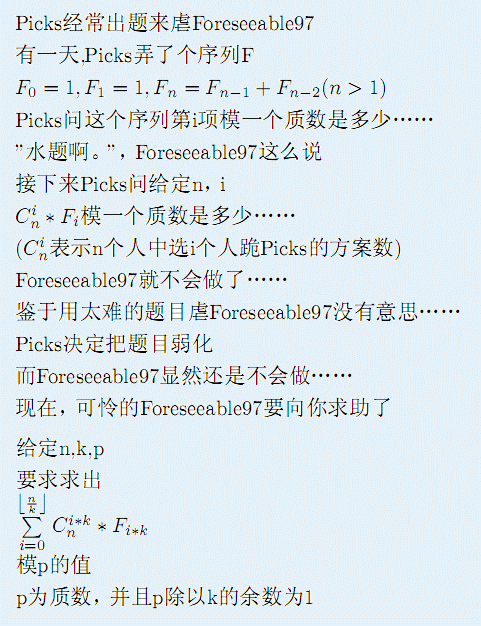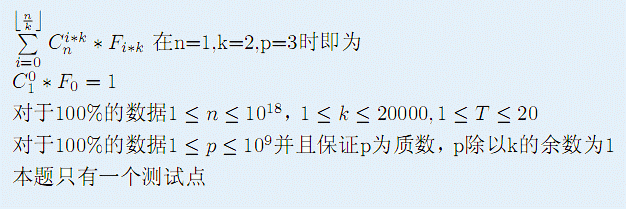Description
Input
The first line is a positive integer, representing the data group data, and the next T line
Three positive integers per line N,K,P
Output
T line, output an integer for each line, representing the result
Sample Input
1
1 2 3
Sample Output
1
HINT
Source
By Wcmg
Analysis:
The number of combinations is very large, so the number of combinations should be taken into account.
Simplify the appeal formula to get
=∑i=0n[i mod k==0](ni)∗F(i)=\sum_{i=0}^{n}[i\ mod\ k==0]\binom{n}{i}*F(i)=i=0∑n[i mod k==0](in)∗F(i)
Considering unit root inversion, we get
=∑i=0n1k∗∑j=0k−1(wkj)i∗(ni)∗F(i)=\sum_{i=0}^{n}\frac{1}{k}*\sum_{j=0}^{k-1}(w_{k}^j)^i*\binom{n}{i}*F(i)=i=0∑nk1∗j=0∑k−1(wkj)i∗(in)∗F(i)
Exchange cycle,
=1k∗∑j=0k−1∑i=0n(wkj)i∗(ni)∗F(i)=\frac{1}{k}*\sum_{j=0}^{k-1}\sum_{i=0}^{n}(w_{k}^j)^i*\binom{n}{i}*F(i)=k1∗j=0∑k−1i=0∑n(wkj)i∗(in)∗F(i)
Where, F(i)=AiF(i)=A^iF(i)=Ai, AAA is the recurrence matrix of Fibonacci sequence. Then there is a binomial expansion.
=1k∗∑j=0k−1(wkjA+I)n=\frac{1}{k}*\sum_{j=0}^{k-1}(w_{k}^jA+I)^n=k1∗j=0∑k−1(wkjA+I)n
The direct O(klogn)O(klogn)O(klogn) is good.
Code:
/**************************************************************
Problem: 3328
User: liangzihao
Language: C++
Result: Accepted
Time:8932 ms
Memory:1300 kb
****************************************************************/
#include <iostream>
#include <cstdio>
#include <cmath>
#define LL long long
using namespace std;
LL G,n,w,wn,ans,mod;
int T,k,cnt;
int p[101];
struct matrix{
LL a[3][3];
}A,B;
matrix operator *(matrix a,matrix b)
{
matrix c;
for (int i=0;i<=2;i++)
{
for (int j=0;j<=2;j++) c.a[i][j]=0;
}
for (int k=1;k<=2;k++)
{
for (int i=1;i<=2;i++)
{
for (int j=1;j<=2;j++) c.a[i][j]=(c.a[i][j]+a.a[i][k]*b.a[k][j]%mod)%mod;
}
}
return c;
}
LL ksm(LL x,LL y)
{
if (y==1) return x;
LL c=ksm(x,y/2);
c=c*c%mod;
if (y&1) c=c*x%mod;
return c;
}
void divide(int x)
{
for (int i=2;i<=trunc(sqrt(x));i++)
{
if (x%i==0)
{
p[++cnt]=i;
while (x%i==0) x/=i;
}
}
if (x>1) p[++cnt]=x;
}
void findroot(int x)
{
for (int i=2;i<x;i++)
{
int flag=0;
for (int j=1;j<=cnt;j++)
{
if (ksm(i,(x-1)/p[j])==1)
{
flag=1;
break;
}
}
if (!flag)
{
G=i;
return;
}
}
}
void power(LL p)
{
if (p==1)
{
B=A;
return;
}
power(p/2);
B=B*B;
if (p&1) B=B*A;
}
int main()
{
scanf("%d",&T);
while (T--)
{
scanf("%lld%d%lld",&n,&k,&mod);
cnt=0;
divide(mod-1);
findroot(mod);
wn=ksm(G,(mod-1)/k);
w=1;
ans=0;
for (int j=0;j<k;j++)
{
A.a[1][1]=1,A.a[1][2]=w;
A.a[2][1]=w,A.a[2][2]=(w+1)%mod;
power(n);
ans=(ans+B.a[2][2])%mod;
w=(w*wn)%mod;
}
ans=ans*ksm(k,mod-2)%mod;
printf("%lld\n",ans);
}
}